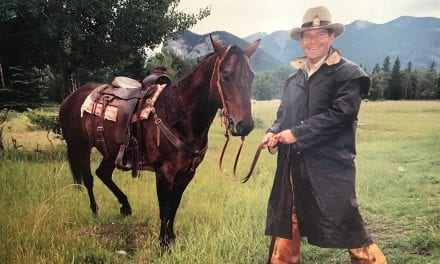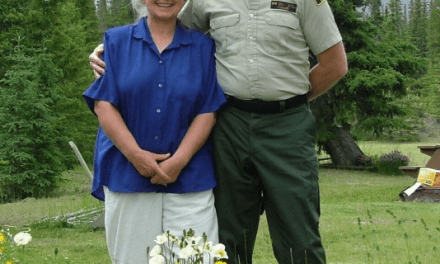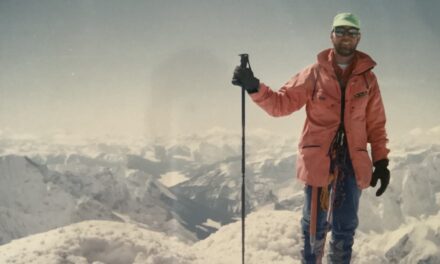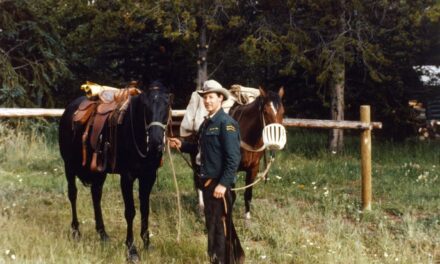“Did you spend a few years in Banff?”
Just two years. (Truth be known I spent two years trying to get the heck out of there! I tell this story to many people, working in some smaller parks is like being on a high school football team and working in Banff is like being in the Super Bowl! So it was quite busy, we were centralized living in town. Struggling, I guess financially at that time. Because you were living in town expenses were higher. Believe it or not, I went from $15/month rent to $126/month rent. On a wardens income that was a lot in those days. Like I said, I spent two years trying to get the heck out of there.
(18:05) From there (Banff) I went to Kluane.
“It sounds like an amazing place.”
Yeah, it is. Out of all the park locations, I think Kluane was my favorite. I worked at ten different national parks. I think that was my favorite because there was a sense of the old. It wasn’t an operational park per se. You did have rescue work, we did have poaching incidents that went on there and so on, but you didn’t have the people issues. You did a lot of resource study work. Those were the days when there was lots of money, the Trudeau era. Our horse was no longer the horse, it was helicopter. We had about 640 hours a year helicopter time. It was big, big country, huge country. Our primary goal at first was to get to know the country and the people who were in the country, lodge owners, people in the smaller communities and so on. More or less strike up conversations about what national parks were.
“Did you find people quite open to the idea of the national park?”
Yeah, I think people in the north were probably the friendliest people that I have ever met really. They were pretty receptive. You always ran into the odd individual, but basically they were a great bunch of people. I can remember one of the old timers up there saying about myself and another good friend of mine that was working up there Lloyd Freese, who just retired after 41 years, he said because we had been hiking and learning the park so much, most of it was on foot or by helicopter, he said, he didn’t think anyone knew the country as well as we did. So you develop a rapport with lodge owners then you find out after a little while that they start telling you secrets about other lodge owners and who may be doing what inside the park or sanctuary. There was a larger piece of land called the Kluane Game Sanctuary before it became a national park. It was maybe 10,500 square miles and Kluane was 8800 square miles. There were pieces of the sanctuary that still existed after the park (had been formed). It was still being protected as a sanctuary and some of these locals would be in there trapping or whatever, doing things that they shouldn’t ought to be doing.
(21:55) I was four years in Kluane and from Kluane, I went down to Pukaskwa National Park. Yeah, it was on the north shore of Lake Superior and it was a very isolated park. That was another change.” There was no access per se other than by boat. It was quite a different park that is for sure…We never got into the park very often because of the access issues, however we had fulltime jobs, and we worked from the office and had a lot of office work if you know what I mean. It was a situation I didn’t really enjoy I guess because I wasn’t getting out (into the park). The winters were harsh and Lake Superior was a big body of water. We needed large boats to be out there constantly and we didn’t have large boats. You were at the mercy of the wind and the water. So we didn’t have an opportunity to get out into the park as often as I would have liked. I was Chief Warden there.
“In Kluane were you working as the chief?’
(23:33) I was an Area Manager in charge of the Donjek area.) It is the northern part of the park. Destruction Bay is where I had lived in Kluane and my last year I moved to Haines Junction, but that was just during my last year…
“You were Chief Warden in Pukaskwa for how long?”
(24:55) For one year. I realized that I had made a mistake. I realized (a) that I was too young and (b) that I was in a bad spot. My marriage was beginning to fall apart and this is also where I met my second wife, so I left the warden service for ten months.
“Were you able to take a leave?”
No, I decided that that was what I was going to do. I left and I moved to Invermere for ten months and again realized quickly that I had made another mistake! Everybody I talked to, it was like I had these little flags on my nose talking about national parks, so within ten months I was back on. I had to re-compete and I began seasonally again and I went to Waterton. I worked there for five years.
“Would this have been the late 1970s?”
This was 1980. I left Pukaskwa in 1979.
“Was Max Winkler there then?”
Yeah, he was Chief Warden. Derek Tilson was there, Keith Brady, Bob Bauk, Frank Coggins and Rob Watt. And there was half a dozen of us seasonals, myself of course, Bill Thorpe, David Gilbride, Randy Smurkey. They were there and the job was quite different. It was one of my favorite parks to work in as well. The job was quite different…because it was smaller you were involved in virtually everything. I worked there three years and then I got a permanent position and my permanent position was in Waterton…
“Did you live in the park?”
We lived in the townsite actually. Our first residence was right across from the post office and our second one when I became a permanent warden was a warden house just south of the school. It is no longer a school, but it was just down below. Anyways, I spent two years there as a permanent warden and then transferred from there to Georgian Bay Islands.
(28:56) It was extremely different work because you were working a, in an operational park, a well established park with a lot of visitor issues and b, because it was smaller there were a lot of resource issues. Because of the environment, you were in a relatively warm environment working with different kinds of wildlife. Instead of working with big game, big horn sheep, elk and so on you were working with turtles, frogs, snakes, rattle snakes. So, it was quite a different experience. I think it was there that I talked to a guy by the name of Dave Lonis and he was the director of the Natural Resource Branch of Ottawa. I wasn’t alone in the discussion, there were other people in the discussion and I remember him saying, because we were all complaining about things, about how we would like to see things differently. He said, “You know, you wardens…are the worst complainers. If you really want to do something about it, why don’t you become Chief Warden and try to change these things.” So I bid on a national omnibus competition, a chief park warden competition and qualified high up enough to be offered a position in Fundy National Park as Chief Warden. From one coast to the next and I worked there for four years, from 1987 to 1991.
(30:51) It was a good park. A typical operational park, it was very similar to what goes on in Banff or Jasper, except it doesn’t have the mountains. It has other different kinds of issues. It was a really good experience for my career. My wife’s father’s health was failing though and she is from Ontario. A position became available in Ontario, so I decided to go back to Ontario, to St. Lawrence Islands National Park as the Chief Warden. It was primarily for family issues, but it was also a great work experience. I think that it was the first time in my career that I was able to get out of what we call job imposed occupancy and go from government housing into private housing. Not that I was thinking about retirement, I wasn’t thinking about retirement at that stage of my career, but you begin to realize that equity later on in your career is a huge issue if you don’t have any when you retire. So that is when I began to have those thoughts. Anyways, I was in St. Lawrence Islands for nine years. I left there in 2000.
“A lot of wardens spoke of that getting your own home as opposed to being in government housing.”
Yeah, you find out a large percentage of your wage was going towards housing and you had the other part to exist on. It was a great existence. It was a career, rather than a job. However, you didn’t have a large savings and living where we lived there wasn’t the opportunity often for wives to work. So we (just) had my income. It wasn’t until later on that you didn’t really have to think about those things…Anyways I worked in St. Lawrence Islands for nine years. It is the smallest national park in Canada, but in reality it has a big park feeling because the park was made up islands and parts of islands between Kingston and Brockville which was about 80 kilometers of the St. Lawrence River. You patrolled by boat that was the only way to access the park. The experience was much like working in the Georgian Bay Islands.
‘Did you have a lot of marine experience with your dad being in the navy?”
The only time I really acquired a lot of experience when I think about it was probably in Pukaskwa. You would be out in a boat in Kluane, primarily private boats in the Mush Lake area, but you weren’t out in park boats very often. I didn’t have a lot of experience in boats, that’s for sure until Georgian Bay.
(34:40) After being in St. Lawrence Islands the draw for the west was there again…You were classified as chief park wardens, but then we became chiefs of resource conservation. In my case in St. Lawrence Islands there was downsizing first in the 1990s and there was an integration of the warden service and interpretation. Pacific Rim had virtually done the same thing, interpretation to some degree and the warden service had amalgamated and created a resource conservation (group) with the ecosystem secretariat as well. So it meant a promotion. I bid on that and qualified first for that position and I happily moved there. I finished my career in January of 2004 there. I went there in the year 2000.
“Could you please tell me your title again?”
I was Chief Resource Conservation.
“An incredible career, from coast to coast.”
It was an usual one too. Maybe you will see that more now that back then of course…
“What about the warden service was important to you?”
(36:50) Living the life, was important. As I said before, it was a career, it was my job. I didn’t mind working 12/14 hour days because I enjoyed it. Even though your wife may not have had a job, she was part of the job as well, selling fishing licenses, painting, getting out information and so on. She would be your help when you were doing some trail maintenance. Even just simply looking after horses, if you had to get down and cut a tree off the trail, or doing something more major like working in a grub hole, or repairing single strand forestry line.
(38:07) My first real trip into the backcountry was when I was working with Mac Elder. I went in with Bob Haney into the Rocky River district and worked with him for three weeks doing nothing but repairing phone lines that had been knocked down by avalanches the year before. I was primarily just living the life of a warden, the protection part was obviously a good aspect of it. It is an unique job and it is a unique place to live.
“What did you like least about being a warden, was it the law enforcement?”
(39:24) It wasn’t so much the law enforcement it was the type of law enforcement. If you are involved with natural resource enforcement, poaching and so on, that is very exciting work. But when you are dealing with rowdies in a campground situation, I didn’t hire on so to speak to do that kind of work. That was probably what I disliked most. It was funny because I had gone from Banff and we didn’t really do that in Banff, the RCMP and visitor services did that in campgrounds like Tunnel Mountain, my role was primarily moving people out of the day use areas to get them into the campgrounds, then I went north, then I went to Pukaskwa, then I left and I came back to Waterton in 1980 and somewhere between when I left Banff and worked in Waterton we got involved with campground style enforcement, dealing with the rowdies. I don’t know what the decision was there, I just suspect that it was because the RCMP pulled away from that responsibility. Maybe they had downsizing of their own.
“Do you think Sharon enjoyed the warden life?”
(40:50) I think both wives did) When I worked in Jasper we lived in, not a primitive, but a basic house. I will give you an example, when I was at Mile 45, I lived in a cabin. It had no plumbing, it was a 10 foot, by 16 foot outside dimension, with my wife and child. She was a year old. We had a pull-out that we bought and we put it up during the day for somewhere to sit and then at night we pulled it down and put the cushions on the floor for our daughter to lay on. Then we had a little two person table with chairs and we had a heater in the corner and that was it. We had a funnel that we put in the corner of the building with a slop pail underneath it for washing dishes and of course our outhouse was over by the barn. That’s just an example. It was unusual, but you know what? It was all part of the experience.
(42:22) Some of the things that I do remember are when…Bob Barker and I got flown into Cairn Pass in March of 1972. (the question, “What are some of the more memorable events of your career?”) First of all 1971, the winter starting in 1971 was the first year we opened up the Banff Jasper Highway. It was always closed during the winter prior to that, And we when I say we, I mean Willi Pfisterer, Toni Klettl, myself, Abe Loewen and I think Hans Fuhrer, got involved in developing an avalanche control program for the Banff Jasper Highway. There are some stories involved with that too because everything was experimental at first, trying to gage that right amount of pressure and the bomb size and so on…But anyways Bob and I got flown in to Cairn Pass, in March of 1972. It was a severe winter for snow. We were just on a snowshoe patrol…I think that we were out for almost three weeks and we were following a wolf pack during these three weeks, from Cairn Pass all the way up the valley to the Southesk, up the Brazeau…essentially before coming out to the highway we were at the Brazeau warden station for a few days. I think that we were collecting sheep scat too up on the hill and behind for some research. We had done that and the decision was we were going to come out over Four Point and into Camp Parker. It was heavy, heavy snow. When we left it was snowing pretty hard and also we were getting close to the wolf pack. Just before Four Point cabin we saw a pile of ravens and we knew that the birds were on a kill and we decided that the wolves must be there, close at hand. I will try and paint a picture here. There was an open valley and Engelmann spruce on either side of the valley that maybe went for a couple of hundred feet elevation and there was open alpine country above it. We snuck through the Engelmann spruce on snowshoes. We still didn’t know what the kill was, but then we began to hear some wolves, or younger wolves whining who were almost a year old at that time…I had a camera, it was called a Polaroid Swinger, black and white and Bob had a Bolex camera that took super eight movie films. The decision was that we would try and get some pictures of the wolves. I remember we were in a little bit of a clearing, not much larger than this room, maybe a bit larger. Bob went in towards where we could hear the wolves whining and I was trying to get my film in because it was a Polaroid you know, you had a cartridge that you had to put in. I was trying to get my film in and Bob disappeared in the trees and I heard this shuffle in front of me and I looked up and there was an adult male wolf in front of me! Its belly was full it was almost touching the snow. The snow was deep so his legs were in the snow. I took a picture with my Polaroid. I got the picture and I am thinking that, “Bob is really doing well. He’s probably got all these pictures.” Anyways after a minute or two this wolf finally disappeared. It just stood there and looked at me for a bit. He disappeared and went across the valley and then there were eight more dogs right after him that went right across the valley. They were too far away for me to get a nice picture, but I could see it clearly in the opening in the valley. I think it was maybe a few seconds later after they disappeared into the trees on the other side that Bob comes along. He asked if I had seen some wolves. I said, “Yeah, did you see them?” He said, “No, no I didn’t.” I said, “Well there, they just went across the valley.” I showed him my picture, the black and white of the one dog. Bob went over on his snowshoes across the valley and I stayed where I was. Out below as he just got into the timber on the other side out comes these wolves below where Bob was and they crossed, the nine dogs. I am seeing this, but again it was too far away to get a picture. They disappeared and now they came back to my side and then they disappeared in the trees on the other side. It was like a cartoon because you were wearing snowshoes and that circular motion in the feet! Bob was coming across the valley with his Bolex camera and he never did get a shot!
(48:20) Anyway we went to Four Point cabin because it was only a matter of a short distance. We thought that we were going to stay there the night, but a wolverine had broken in and completely ransacked the cabin and pissed all over everything. There was just a stench in there so we decided we couldn’t stay there, so we were gone. You can imagine, there was heavy snow, it was a heavy snow winter and we had to get up over the pass, Nigel Pass and the light was so poor. It was a white out. Luckily, Bob had a sense of where he was going because it was my first trip there in the winter. The snow was wet and heavy and sticking to our snowshoes. We cut some sticks to bang it off our snowshoes and luckily we did that because when we hit the high country we were starting to slide backwards! We would stick the sticks in as webbing. Then we got up high and realized at the pass there was a huge cornice. We couldn’t get up over the cornice, so we cut a hole through the cornice and luckily it never avalanched. We made it through the cornice and got up and decided it is only a few miles down to Camp Parker and when we got down there we were going to start a fire. By this time we had been out a long time, it was dark. It was quite dark and we were exhausted. I call it punch drunk! We would just fall on the snow and laugh. We finally made it to Camp Parker, lit up a fire in the stove and there was so much snow on the roof, it smoked us out! There was nothing getting through, the roof was too steep and loaded to get up onto it to clear it off, so we made the decision that we were going to go up onto the highway now and hitch a ride. When we got up to the highway and there was about three feet of fresh snow on the road. We knew there was an emergency phone at the Columbia Icefieds and we started snowshoeing up that way. Luckily after the Youth Hostel there, one of the heavy equipment operators was tending to a grader. He could see us coming at a distance and he gave us a ride down to Mile 45. We would have had a lot further to walk yet…There were other aspects to that story, but that was a memorable one for me!
“You said, Kluane was your favorite park to work in?”
“What was it about Waterton and Jasper?”
(51:19) Kluane yeah. Waterton and Jasper were other favorites. But Kluane was my favorite for work experience that’s for sure. Jasper because of the backcountry. Waterton…because I was able to become involved with all (aspects of the job), the resource management, and there wasn’t a lot of mountain rescuing the rocks down there are quite different than the limestone here and in Jasper, but there were searches and so on. A lot of resource management work, the wildlife work there was incredible, working with bear management and other species.



